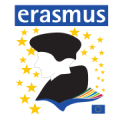Program Erasmus powstał w 1987 roku jako program wymiany studentów. Mimo że jego zasięg i cele poszerzały się w kolejnych latach, główna idea pozostaje ta sama: rozwijanie międzynarodowej współpracy między uczelniami. Nazwa Erasmus nawiązuje do imienia holenderskiego filozofa i teologa, humanisty, Erazma z Rotterdamu (1466-1536). Nie bez przyczyny. Erazm, jak inni wybitni ludzie renesansu, kształcił się w wielu uczelniach w różnych krajach Europy, a jego poglądy na edukację przesycone były głębokim humanizmem.
Erasmus powstał w 1987 roku jako program wymiany studentów. Mimo że jego zasięg i cele poszerzały się w kolejnych latach, główna idea pozostaje ta sama: rozwijanie międzynarodowej współpracy między uczelniami. Nazwa Erasmus nawiązuje do imienia holenderskiego filozofa i teologa, humanisty, Erazma z Rotterdamu (1466-1536). Nie bez przyczyny. Erazm, jak inni wybitni ludzie renesansu, kształcił się w wielu uczelniach w różnych krajach Europy, a jego poglądy na edukację przesycone były głębokim humanizmem.
Erasmus jest programem dla uczelni, ich studentów i pracowników. Wspiera międzynarodową współpracę szkół wyższych, umożliwia wyjazdy studentów za granicę na część studiów i praktykę, promuje mobilność pracowników uczelni, stwarza uczelniom liczne możliwości udziału w projektach wraz z partnerami zagranicznymi. W niektórych jego akcjach mogą uczestniczyć również inne instytucje, organizacje lub przedsiębiorstwa, które współpracują ze szkołami wyższymi.
Polska bierze udział w programie Erasmus od roku 1998/99. W latach 1995-2006 Erasmus wchodził w skład wspólnotowego programu Socrates, a od roku akademickiego 2007/2008 jest częścią programu „Uczenie się przez całe życie” (LLP – the Lifelong Learning Programme), programu Unii Europejskiej w dziedzinie edukacji i doskonalenia zawodowego, przewidzianego na lata 2007-2013.
Kraje uczestniczące:
- 27 krajów Unii Europejskiej;
- 4 kraje Europejskiego Obszaru Gospodarczego: Islandia, Lichtenstein, Norwegia i Szwajcaria;
- 2 kraje kandydujące: Chorwacja i Turcja.
W Erasmusie bierze obecnie udział ok. 4 tysiące uczelni z krajów uczestniczących w programie. Na stypendia Erasmusa wyjechało do tej pory ponad dwa miliony studentów, około 240 tysięcy nauczycieli akademickich i około 20 tysięcy innych pracowników uczelni. Erasmus rozszerza swoje wpływy szybciej niż Unia Europejska, włączając w działania kraje kandydujące dużo wcześniej, niż stają się one państwami członkowskimi.
Małopolska Wyższa Szkoła Ekonomiczna w Tarnowie uczestniczy w programie od 2000 r.
The Erasmus program was established in 1987 as a student exchange program. Although its scope and objectives broadened in subsequent years, the main idea remains the same: to develop international co-operation between universities. The name refers to the name of Erasmus Dutch philosopher and theologian, humanist, Erasmus of Rotterdam (1466-1536). Not without reason. Erasmus, like other eminent men of the Renaissance, was educated in various universities in different European countries, and his views on education were deeply imbued with humanism.
Erasmus is a program for the university students and employees. It supports international cooperation in higher education, allows students' trips abroad for part of the study and practice, promotes the mobility of university staff, creates numerous opportunities for universities to participate in projects with foreign partners. Other institutions, organizations or companies that cooperate with universities may also participate in some of its actions.
Poland has participated in the Erasmus program since 1998/99. In the years 1995-2006, it was part of the Erasmus Socrates program of the Community, and from the academic year 2007/2008 it has been a part of the „Learning for life” (LLP – The Lifelong Learning Programme), the European Union in the field of education and training provided for 2007-2013.
The participating countries:
- 27 European Union countries;
- 4 countries of the European Economic Area: Iceland, Lichtenstein, Norway and Switzerland;
- 2 candidate countries: Croatia and Turkey.
Currently, there are about four thousand universities involved in the Erasmus Program. Erasmus scholarships went so far over two million students, about 240 000 teachers and about 20 thousand other university staff. Erasmus extends its influence faster than the EU, including candidate activity much earlier than they become Member States.
Małopolska School of Economics in Tarnów has participated in the program since 2000.
 Wirtualny Dziekanat
Wirtualny Dziekanat 

